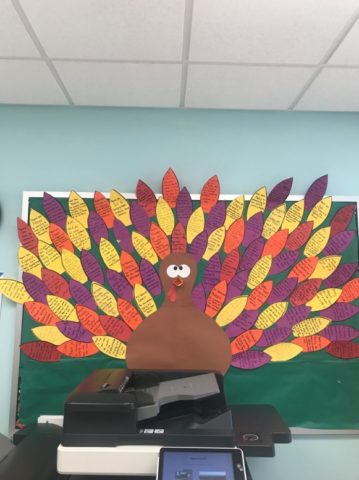17
Nov 2022
Throw It Like Confetti
Aviva Walls
In July of 2020, I began a new role as the Head of School of Gesher Jewish Day School. After weeks of deliberation with the board, leadership team, and medical experts, we made the decision to open our school in September 2020 for in-person learning and I spent the next several months planning for a school year unlike one I’d ever experienced. My team and I worked for hours developing plans for distancing, communication, teacher training and handwashing protocols.
It turns out, that two years later, it wasn’t the answers about desk distance or podding that endured; but rather, those about how to make the work emotionally sustainable. When our team came together that August for our annual leadership retreat, I asked them to imagine what it would take to successfully make it through the year. Along with coffee, vulnerability, and patience, we identified gratitude as an important key.
We threw gratitude around like confetti. We thanked our parents for their trust, our students for their persistence, and our faculty for everything they sacrificed to ensure our students could learn in person. We handed out 6 challah rolls to every teacher when we made it through 6 weeks of school and delivered gift bags before winter break overflowing with goodies for the week off. However, it's our beloved “Grati-turkey” that has endured as an annual tradition. I’ve read the research from Tal Ben Shacher on the power of positive psychology and knew that writing notes of sincere gratitude increases happiness not only for the recipient, but also for the author. To encourage notes of thanks from one faculty member to another, we created a raffle around Thanksgiving with each note of gratitude acting as an entry and the prizes were Starbucks gift cards. Because we wanted to lean into the joy of the holiday, those entry notes took the form of construction paper “feathers” and the bare brown body of the “Gratiturkey” quickly filled up the bulletin board with red, orange, yellow and purple feathers.

"Gratiturkey" - Photo by Aviva Walls
The gratitude expressed was personal, specific, and public. The next year, this culture grew and one of our faculty developed the “sunshine form”, a google form where every faculty member could write in the specific snacks, beverages, and trinkets that light up their day. There is nothing like a surprise Twix or bag of roasted almonds on my desk to make my day.
Even as the culture of expressing thanks took root among our team, I worried that every thank you would begin to feel hollow. This could have been a moment to back down; instead, I doubled down and chose to seek out ways to sincerely thank members of the team as individuals. To this day, every week, I take 30 minutes to write individual notes to three to five members of the team who have gone above and beyond or generally exemplified our organizational values. I am sure to hand out these notes to our team in front of the students, so that they know that every one of us does what we can to express HaKarat HaTov, recognition of the good.
The habit has revolutionized my leadership. I now seek out moments to recognize paying greater attention and reinforcing what we’re doing well rather than just what we can do better. When I’m having a tough day, I notice this ritual reinvigorates me to the mission of our school to our values much like a management gratitude journal. The practice has also allowed me to develop stronger relationships with our team, who enjoy being recognized for the ways they contribute. It’s hard to know for sure, but I believe that these small expressions of gratitude have also improved our teacher morale. Despite a national crisis in teacher retention and the concerning domestic trend of leaving the field altogether, we have experienced incredibly low turnover, losing only one teacher to another school in over two years and none have left the profession.
Like any cultural shift, this effort took time, deliberate and thoughtful steps and an incredible team to bring the theory into reality. While I understand that a culture of gratitude at an elementary school may look different than at another Jewish organization, I know I am a better leader with a more sustainable emotional lift because of these changes.

Get to know the author
Aviva Walls (WFF Class 6) serves as Head of School of Gesher Jewish Day School in Fairfax, VA. Previously, Aviva served as Dean of Academic Affairs and Director of College Counseling at Shalhevet High School. Aviva believes that the goal of education is to fan the sparks of divinity that live in every human being and help our children recognize those sparks in others and that experience and reflective practice are the keys to learning and growth.

